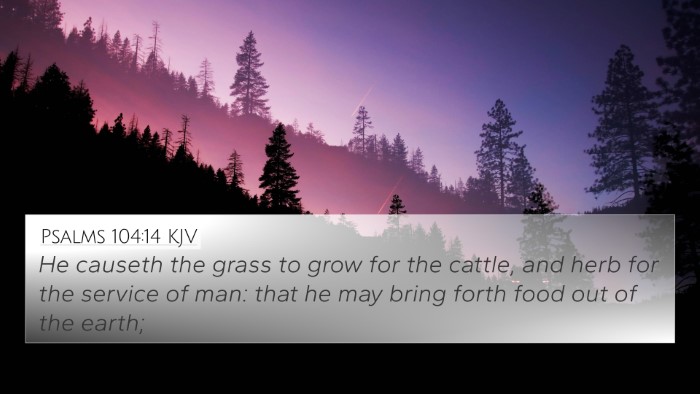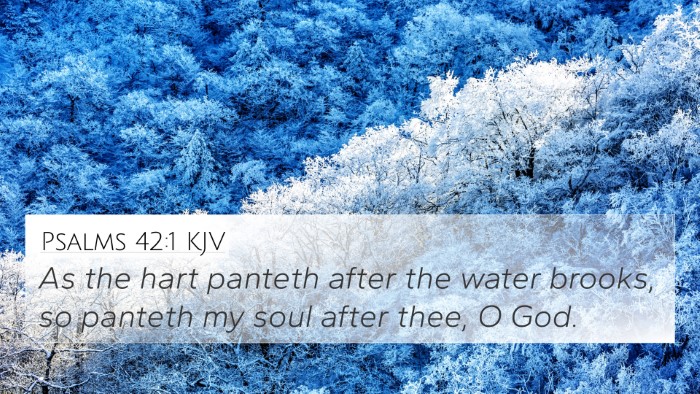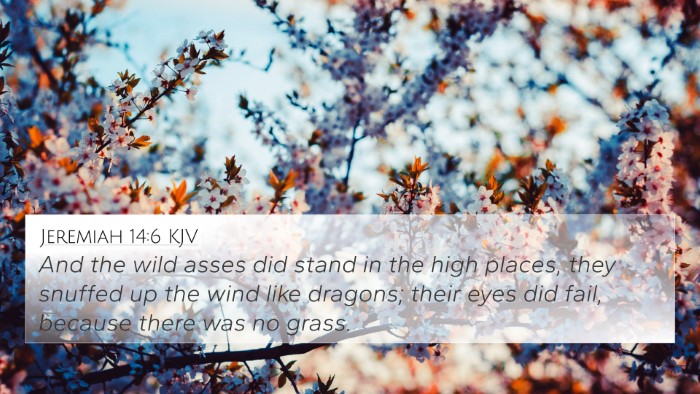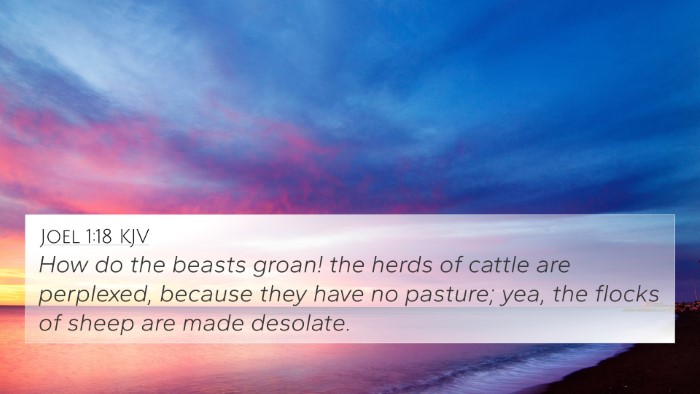Old Testament
Genesis Exodus Leviticus Numbers Deuteronomy Joshua Judges Ruth 1 Samuel 2 Samuel 1 Kings 2 Kings 1 Chronicles 2 Chronicles Ezra Nehemiah Esther Job Psalms Proverbs Ecclesiastes Song of Solomon Isaiah Jeremiah Lamentations Ezekiel Daniel Hosea Joel Amos Obadiah Jonah Micah Nahum Habakkuk Zephaniah Haggai Zechariah MalachiJob 6:5 Similar Verses
Job 6:5 Cross References
Doth the wild ass bray when he hath grass? or loweth the ox over his fodder?
Uncover the Rich Themes and Topics of This Bible Verse
Listed below are the Bible themes associated with Job 6:5. We invite you to explore each theme to gain deeper insights into the Scriptures.
Job 6:5 Cross Reference Verses
This section features a detailed cross-reference designed to enrich your understanding of the Scriptures. Below, you will find carefully selected verses that echo the themes and teachings related to Job 6:5 KJV. Click on any image to explore detailed analyses of related Bible verses and uncover deeper theological insights.

Psalms 104:14 (KJV) »
He causeth the grass to grow for the cattle, and herb for the service of man: that he may bring forth food out of the earth;

Psalms 42:1 (KJV) »
As the hart panteth after the water brooks, so panteth my soul after thee, O God.

Jeremiah 14:6 (KJV) »
And the wild asses did stand in the high places, they snuffed up the wind like dragons; their eyes did fail, because there was no grass.

Joel 1:18 (KJV) »
How do the beasts groan! the herds of cattle are perplexed, because they have no pasture; yea, the flocks of sheep are made desolate.
Job 6:5 Verse Analysis and Similar Verses
Understanding Job 6:5
Job 6:5 poses a profound question regarding suffering and the expectations placed on the sufferer. As Job speaks amidst his overwhelming anguish, he questions whether the natural world responds to pain and adversity. This verse captures the essence of Job's struggle against his situation and the disbelief that those who suffer can often feel.
Context of Job 6:5
In the context of the book of Job, this verse appears during Job's discourse where he laments his suffering and seeks to explain the nature of his predicament. Job, a righteous man, has lost his wealth, children, and health, leading him to question the very foundations of justice and divine oversight.
Commentary Insights
- Matthew Henry's Commentary: Matthew Henry emphasizes that Job's rhetorical question reflects the incongruity between suffering and the expected comfort that comes from nature. Job rhetorically asks if a wild donkey brays when it has grass, illustrating that suffering should evoke sympathy rather than disdain. It highlights the innate understanding that pain is a shared human experience.
- Albert Barnes' Notes: Barnes expands on the analogy Job uses, stating that just as animals exhibit pain only when it is warranted, humans too seek acknowledgment of their suffering. The point made here underscores that true comfort does not come from simply enduring pain, but from being heard and understood in one's suffering.
- Adam Clarke's Commentary: Clarke suggests that the question posed by Job implies that it is natural for beings to express discomfort and suffering. He interprets this as a profound statement on the nature of humanity, showing that even in the depth of misery, there is an expectation for a response, whether from God or from fellow humans.
Thematic Connections
The verse invites analysis of themes surrounding suffering, empathy, and the human condition. The core of Job's lament is his desire for understanding and the absence of solace in the face of unmerited suffering.
Bible Verse Cross-References
Several Bible verses relate to Job 6:5, establishing a network of connections that enrich the understanding of human suffering. The following are notable references:
- Psalm 34:18: "The Lord is close to the brokenhearted and saves those who are crushed in spirit." This verse underscores the idea that God is near to those who suffer, providing a counterbalance to Job's feelings of abandonment.
- Isaiah 53:3: "He was despised and rejected by mankind, a man of suffering, and familiar with pain." This prophetic verse aligns Job’s experiences with the suffering servant of God, emphasizing collective anguish.
- 1 Peter 5:7: "Cast all your anxiety on Him because He cares for you." This directs those in suffering towards divine comfort and an assurance of God’s attentiveness to pain.
- 2 Corinthians 1:3-4: "Praise be to the God and Father of our Lord Jesus Christ, the Father of compassion and the God of all comfort." This speaks to the role of God as the ultimate source of comfort during distress, reflecting Job's desire for understanding.
- Romans 8:18: "I consider that our present sufferings are not worth comparing with the glory that will be revealed in us." This offers an eschatological hope that all suffering will one day be eclipsed by glory.
- Matthew 11:28: "Come to me, all you who are weary and burdened, and I will give you rest." This is a direct invitation to find solace amidst pain, echoing Job's search for comfort.
- John 16:33: "In this world, you will have trouble. But take heart! I have overcome the world." This reinforces the reality of suffering while pointing to Christ as the source of hope.
Exploring Suffering through Cross-Referencing
The theme of suffering connects widely across scripture. Utilizing a Bible cross-reference guide can help readers explore these connections more deeply. For example, connecting Job's plight with the New Testament teachings provides a fuller picture of how suffering is perceived both in the Old and New Testaments.
Conclusion
Job 6:5 opens a window into the deep emotional landscape of suffering and the universal need for compassion. The insights derived from commentaries and related scripture reflect a rich tapestry of theological understanding. As one seeks to study the connections between Bible verses, resources such as a Bible concordance or cross-reference Bible study methods can illuminate how different passages interact and inform each other, enriching both personal study and communal teaching.


